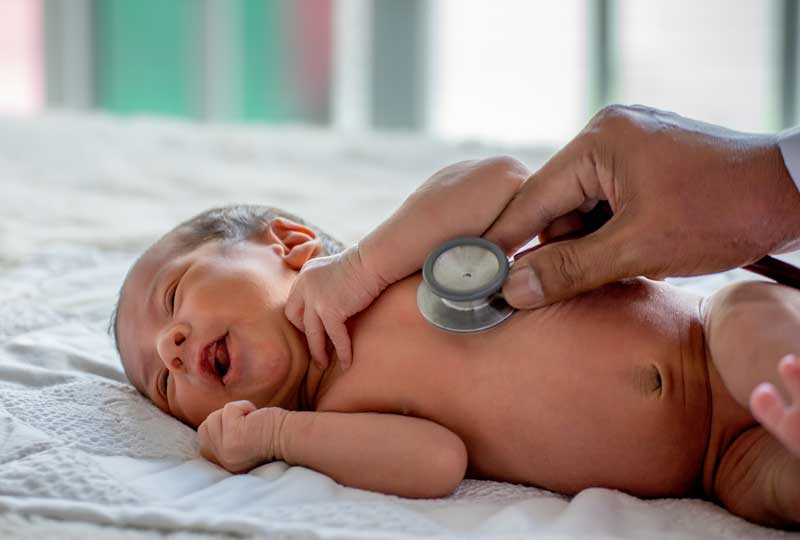Hearing that your child has a congenital heart defect can be overwhelming — and scary. Here’s what you need to know.
If you ask Dr. Donald Moore, associate professor of Pediatrics and Cardiology and director of Pediatric Cardiology Outpatient Clinics for Monroe Carell Jr. Children’s Hospital at Vanderbilt, to define a congenital heart defect, his answer will be concise and clear.
“It’s a structural defect within the heart that is beyond the scope of normal development,” he’ll say, adding that the defect is present at birth.
But that’s where explanations related to congenital heart defects stop being easy.
The reason? There are so many unknowns — and also such a vast spectrum of cases. Your child’s heart defect might be associated with genetic conditions, such as Downs syndrome, or its cause is commonly unexplained. It might affect the right or left side of their heart. It might be something they’ll outgrow, or it might require immediate intervention.
In short, every heart is different, so every heart defect is different. However, there are certain things common to all congenital heart defects that parents should know. Below, Moore shares his insights on what congenital heart defects are, and what they are not.
What a congenital heart defect is not:
A CHD is not your fault. “Time and time again, parents ask, ‘What did I do wrong? Is there something I did or didn’t do?’ And there’s a sense of guilt,” Moore said. “But I tell them, there’s nothing you did or didn’t do. In the majority of cases, we don’t know why the defect happened. It’s a genetically driven onset in many cases. There are things that can contribute or be associated with abnormalities of the heart: alcohol, drugs, certain maternal conditions, certain medications. But those are associations, not necessarily causes.”
A CHD is not one-size-fits-all. “The defect could be a hole in the heart or an abnormally formed valve — or it could be something much more complicated, where certain parts of the heart just didn’t develop,” Moore said. “It can affect the right heart or the left heart. There’s a real spectrum of severity, even within individual diagnoses.”
A CHD is not always noticed at birth. “High-risk, critical cases are typically going to present before the baby leaves the hospital,” Moore said. “For those that do show up later, symptoms include poor weight gain, difficulty with feeding, taking longer to feed, having trouble breathing during feeding, excessive sweating with feedings, etc. In babies, the ‘stress test’ is feeding; in older children, it’s likely going to be exercise or sports.”
What a congenital heart defect is:
A CHD is something that occurs in early fetal development. “Typically, these defects originate very early in heart development — in the first weeks of embryonic and fetal development,” Moore said. “Many of the causes are not clear. The pioneers who have been investigating heart development are continuing to unravel some of the answers.”
A CHD is the most common birth defect. But that doesn’t mean it’s “common,” generally speaking. “Congenital heart defects appear in about 1-2% of births, so even that is pretty rare,” said Moore. “And about 25% of that slice might be considered critical or requiring immediate intervention.”
A CHD is something your cardiology team will track and follow while your child grows. The most common tests are ultrasounds or echocardiography, which is dedicated ultrasound focusing on your child’s heart. Fortunately, many of these tests can occur at most outpatient clinics that offer cardiology as a specialty, such as Vanderbilt Children’s Specialty Clinics.
A CHD is, in most cases, treatable. “Some defects of the heart can improve with time, remaining mild and not warranting surgical or cardiac catheter intervention,” said Moore. “Some we can manage with medicines. For some cases, of course, we have to offer more aggressive surgical options — which we now can do in the youngest of children — and even cardiac transplant, which is pretty standard now. But there is hope: There’s so much that can be done now that we couldn’t do years ago.”

The nationally-ranked pediatric cardiology experts from Monroe Carell Jr. Children’s Hospital at Vanderbilt see patients at outpatient clinics across Tennessee, including in Jackson. The Vanderbilt Children’s Specialty Clinics in Jackson have on-site ultrasound and echocardiogram capabilities with a dedicated technician to help diagnose and treat CHD and other cardiology issues in children. To schedule an appointment in Jackson or another location, call 615-322-7447 or click here.

